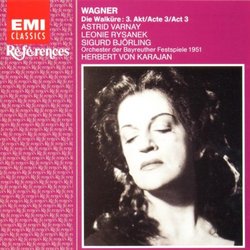| All Artists: Wagner, Varnay, Karajan, Bayreuth Festival Title: Die Walkure, Act III Members Wishing: 0 Total Copies: 0 Label: Capitol Release Date: 7/20/1993 Genre: Classical Styles: Opera & Classical Vocal, Historical Periods, Modern, 20th, & 21st Century Number of Discs: 1 SwapaCD Credits: 1 UPC: 077776470429 |
Search - Wagner, Varnay, Karajan :: Die Walkure, Act III
CD Details |
CD ReviewsThis is grandiose music ''par excellence''. Mr Bassil A MARDELLI | Riad El-SOLH , Beirut Lebanon | 04/18/2008 (5 out of 5 stars) "This disk was first recorded on 12th August 1951 in the Festspiehaus - Bayreuth and published with permission of Wienland and Wolfgang Wagner. "" Quite apart from its intrinsic merits, this recording has a claim to honorable mention in at least three places in the history books. The history of recoded sound distinguishes it as the first live recording of a complete Act of The Ring. In the story of Bayreuth it has a special place as representing something of the first Ring produced there after the Second World War. In the career of Herbert von Karajan it finds him in his first season at Bayreuth and on the threshold of the international success which accorded him such an exalted place in the musical world of his time"" Thus wrote John B. Steane in part of his 1993 introduction to this recording Die Walküre is the second of the four operas that constitute Der Ring des Nibelungen (The Ring of the Nibelung), composed by Richard Wagner. Niberlung is a companion or follower of Siegfried - a German mythology speaking of the race of dwarfs who possessed a treasure hoard that was stolen by Siegfried. As much as I could gather, Die Walküre (The Valkyrie) is Norse saga telling the adventures of any of the beautiful maidens attendant upon the supreme god Odin who bring the souls of slain warriors chosen by Odin or Tyr - son of Odin - to Valhalla and there wait upon them. {{Valhalla is the hall in which the souls of those heroes were received by Odin. Norse is a native or inhabitant of Norway}} Wagner premiered this opera on June 26, 1870 at the National Theatre in Munich. Act 3: Prelude music, Brunnhilde's pleading (War es so schmählich), Wotan's Farewell (Leb' wohl, and Magic Fire Music. The other Valkyries (minor female deities, who served Odin) gather on the height of a mountain, each with a dead hero put in her large bag. They are astounded when Brünnhilde arrives with a woman still alive. She implores them to help her, but they dare not confront Wotan. Brünnhilde decides to delay Wotan as Sieglinde runs away. She also reveals that Sieglinde is pregnant by Sigmund, and names the unborn son Siegfried (meaning "joyous in victory" or "peace in victory"). Wotan arrives in anger and passes judgment on Brünnhilde: she is to be deprived of her Valkyrie position and become mortal, to be prevailed in a magic sleep on the mountain, assaulted by any man who passes by. Horrified, the other Valkyries flee. Brünnhilde begs mercy of Wotan for herself and for his favorite child. She recites the courage of Sigmund and declaresher decision to defend him, knowing that was Wotan's true desire. With the words 'Der diese Liebe mir in's Herz gehaucht' (He who breathed this love into me), she identifies her own actions as Wotan's true will. Wotan accepts her last request: to fill the mountaintop with magic circle of flame, which will dissuade all but the most courageous of heroes who, shown through the leitmotif (typical of Wagner's operas), they both know will be the yet unborn Siegfried. Wotan lays Brünnhilde down on a rock and, in a hug, kisses her eyes closed into a captivated sleep. He calls in Loge (the Norse demigod of fire) to ignite the circle of flame that will protect her, then slowly leaves in sorrow, after pronouncing: "Whosoever fears the point of my spear shall not pass through the fire." This is grandiose music ''par excellence''. " OOP, I guess, but if you can find one... Santa Fe Listener | Santa Fe, NM USA | 09/05/2005 (5 out of 5 stars) "..snatch up this famous recording, one of the classic examples, along with Karajan's Bayreth Meistersinger and Tirstan, of his greatness as a Wagner conductor. Karajan abandoned Bayreth after two seasons when it reopened, so there was nothing until he went back to Wanger in the studio in the mid-Sixties. I love Astrid Varnay, who is his Brunhilde here and his Isolde on the Tristan. No one else in the cast is nearly as good, but Karajan and Varnay carry the day together."
|

